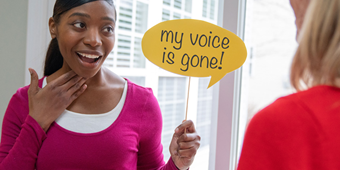Surviving the Teen Brain: 8 Pointers for Parents

Find Your Perfect Match
Answer a few questions and we'll provide you with a list of primary care providers that best fit your needs.
It’s one of the most confounding challenges you will face as a parent: coping with the adolescent brain.
Impulsive, dramatic, illogical — the teen brain can drive you crazy with worry and confusion, until the stress builds and you find yourself screaming, “What the heck were you thinking?”
Whatever your teen is thinking, don’t expect them to have your wisdom and insight. While their bodies are adult-like, their brains are anything but. Poor decision-making and questionable behavior are, unfortunately, normal at this age. But it does get better…eventually.
Instead of saying, "What were you thinking?" ask "What happened? Tell me about this." Ask open-ended questions.
Maturity Takes Time
Experts say that the brain doesn’t fully mature until around the age of 25, give or take a few years.
The frontal cortex (the frontal lobe of the brain) is one of the last areas to mature. This is where executive function is handled, where the brain processes data and examines pros and cons, and organizes what you need to do and where you need to go. It’s also the ethical and moral part of the brain.
Instead, during the teen years, decisions and choices are ruled by the amygdala, which is the emotional center of the brain. That’s why any conversation you might have with your teen, no matter how innocuous it seems to you, can quickly bring your kid to tears or rage or completely shutting down, or other emotions that might seem “over-reactive.”
So, what’s a parent to do until that magic day of maturity arrives? Before giving up in frustration, remember: you still matter to your teen (even if he pretends that you don’t). What you say and do ultimately makes a difference.
8 Tips to Get You Through
To keep your sanity and a healthy relationship with your teen, keep these suggestions in mind:
- Accept that the teen brain just isn’t ready to make certain choices and decisions. It’s like teaching physics to a kindergartner. It’s not that they’re stupid. They just won’t get it.
- Let them make mistakes (as long as they aren’t dangerous mistakes) and don’t solve their problems for them. Mistakes are a good teacher. Let your teen get burned a little bit. If they don’t study for a test or don’t turn in homework, they’ll learn from the long-term consequences.
- Understand that peers are their point of reference. At 15, it’s not that teens are trying to make a bad choice, they just don’t see it that way. They see their friends doing something and think, "Well, my buddies did it and they were okay." Eventually, they’ll mature and realize it was a bad plan, but they’re not there yet.
- Be their soft and safe place to land when they fall. Encourage your teen to talk to you. When they don’t talk, it’s typically because they are afraid of getting judged. They think, "They’re going to be mad at me or ground me." This doesn’t mean that teens shouldn’t face consequences, but they need to hear that they are loved and cared about.
- Talk less, listen more. Follow the old saying, “God gave you two ears and one mouth." Use that as a guide in communicating with your teen. Instead of saying, "What were you thinking?" ask "What happened? Tell me about this." Ask open-ended questions. Then, let them talk.
- Don’t tie love and approval to performance. Some kids think, “My parents are happy when I succeed at football, or when I get good grades." Or, "My parents get mad when I get caught drinking." Teens need to know that they are loved and valued regardless of grades, athletic prowess or poor choices.
- Get to know their friends and find out what’s going on in their friends’ lives. It will give you a sense of what your teen is up to. It would be unusual to be part of a peer group and not be engaged in the same activities.
- Take good care of your teen’s brain, and make sure he does, too. Here are a few things to keep in mind:
- Concussions are a special concern at this age, particularly if your teen is involved in sports. Don’t be fooled by your kid’s size or strength. Concussions can cause long-term damage to the still-developing adolescent brain.
- Alcohol and drugs may have profound effects on the still-developing teen brain, according to the National Institute of Alcohol Abuse and Alcoholism. Researchers say it is unclear yet as to whether those changes are reversible.
- A healthy diet, exercise, and a good night’s sleep also contribute to the well-being of the brain.
It’s Not All Bad
On the upside, there are times when the teen brain can be quite amazing. According to the National Institutes of Mental Health, the adolescent brain adapts well to new technology — a plus in this rapidly changing digital world. Adolescence is also a time of intensely creative thinking, curiosity, and exploration, all of which aids in brain development.

Watch for Warning Signs
While some teen behavior can be concerning, most is normal and age appropriate. However, adolescence is a time when many mental disorders emerge, such as bipolar disorder, schizophrenia, anxiety, depression, and eating disorders.
If your teen starts behaving in a way that is cause for worry (for example, wearing long sleeve shirts in hot weather to cover up signs of cutting, or talking about harming himself or others), talk to a counselor, a clergy member, or your family physician or pediatrician. Don’t just send your child for help — go with him.
Where Is the Love?
As teens seek independence and struggle to find their own identity, don’t fret if you’re not “feeling the love” in return. Overall, know that the behavior your teen is exhibiting is probably just part of his brain’s effort to “grow up” — kind of like growing pains for the brain. Support that effort with a lot of listening, patience and support, even if your teen is not reciprocating.
And maybe this is a good time to get yourself a pet. As Nora Ephron once wrote, “When your children are teenagers, it's important to have a dog so that someone in the house is happy to see you.”
Find Your Perfect Match
Answer a few questions and we'll provide you with a list of primary care providers that best fit your needs.
Source: American Academy of Child and Adolescent Psychiatry; National Institutes of Mental Health; National Institute of Alcohol Abuse and Alcoholism




